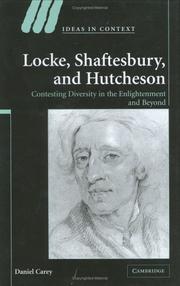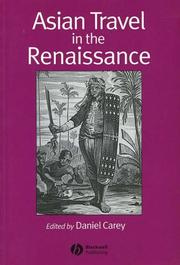| Listing 1 - 10 of 12 | << page >> |
Sort by
|

ISBN: 9780521845021 0521845025 9780511490453 9780521117463 0511137214 9780511137211 0511135041 9780511135040 0511490453 1107152046 9781107152045 1280422157 9781280422157 0511183488 9780511183485 0511201435 9780511201431 0511311656 9780511311659 0521117461 Year: 2006 Volume: 74 Publisher: Cambridge ; New York Cambridge University Press
Abstract | Keywords | Export | Availability | Bookmark
 Loading...
Loading...Choose an application
- Reference Manager
- EndNote
- RefWorks (Direct export to RefWorks)
Daniel Carey examines afresh the fundamental debate within the Enlightenment about human diversity. Three central figures - Locke, Shaftesbury, and Hutcheson - questioned whether human nature was fragmented by diverse and incommensurable customs and beliefs or unified by shared moral and religious principles. Locke's critique of innate ideas initiated the argument, claiming that no consensus existed in the world about morality or God's existence. Testimony of human difference established this point. His position was disputed by the third Earl of Shaftesbury who reinstated a Stoic account of mankind as inspired by common ethical convictions and an impulse toward the divine. Hutcheson attempted a difficult synthesis of these two opposing figures, respecting Locke's critique while articulating a moral sense that structured human nature. Daniel Carey concludes with an investigation of the relationship between these arguments and contemporary theories, and shows that current conflicting positions reflect long-standing differences that first emerged during the Enlightenment.
General ethics --- Locke, John --- Hutcheson, Francis --- Shaftesbury, of, Anthony A.C. --- Benefices [Ecclesiastical] --- Beneficies [Kerkelijke ] --- Bénéfices ecclésiastiques --- Church benefices --- Enlightenment --- Graces [Expectative] --- Lumières (Philosophie) --- Lumières [Siècle des ] --- Pluralism (Benefices) --- Siècle des Lumières --- Verlichting (Filosofie) --- Enlightenment. --- Pluralism. --- Locke, John, --- Shaftesbury, Anthony Ashley Cooper, --- Hutcheson, Francis, --- Pluralism --- Monadology --- Monism --- Philosophy --- Reality --- Aufklärung --- Eighteenth century --- Philosophy, Modern --- Rationalism --- Anthony, --- Cooper, Anthony Ashley, --- Shaftsbury, Anthony Ashley Cooper, --- Sheftsberi, Ėntoni Ėshli Kuper, --- Shaftesbury, Anthony Ashley Cooper --- Philanthropus, --- Lokk, Dzhon, --- Lūk, Jūn, --- Lo-kʻo, --- Locke, Giovanni, --- Lock, --- Lock, John, --- Rokku, Jon, --- לוק, י׳ון, --- Arts and Humanities --- History
Book
ISBN: 9781409400172 9781409448006 9781315606415 9781317063087 9781317063094 9781138109360 1138109363 Year: 2017 Volume: 47 Publisher: London: Routledge,
Abstract | Keywords | Export | Availability | Bookmark
 Loading...
Loading...Choose an application
- Reference Manager
- EndNote
- RefWorks (Direct export to RefWorks)
Hakluyt, Richard --- Discoveries in geography --- Travel writers --- Travel writing --- Voyages and travels --- Travel --- Authorship --- Authors --- English --- Early works to 1800 --- Hakluyt, Richard, --- Hacluyt --- Hackluyt, Richard, --- Travel writers - England - Biography --- Travel writing - Europe --- Discoveries in geography - English --- Voyages and travels - Early works to 1800 --- Hakluyt, Richard, - 1552?-1616 --- Hakluyt, Richard, - 1552?-1616 - Travel - Europe

ISBN: 1405111607 9781405111607 Year: 2004 Publisher: Malden Oxford Carlton Blackwell Publishing
Abstract | Keywords | Export | Availability | Bookmark
 Loading...
Loading...Choose an application
- Reference Manager
- EndNote
- RefWorks (Direct export to RefWorks)
Europeans --- Travelers' writings, European --- European travelers' writings --- European literature --- Ethnology --- Travel&delete& --- History --- Asia --- Europe --- Asian and Pacific Council countries --- Eastern Hemisphere --- Eurasia --- Description and travel. --- Relations --- Description and travel --- Travel
Book
ISBN: 1882203097 Year: 1996 Publisher: Wilmington (Ohio) : Orange Frazer,
Abstract | Keywords | Export | Availability | Bookmark
Book
ISBN: 9780729411387 0729411389 Year: 2014 Volume: 2014:05 Publisher: Oxford Voltaire Foundation
Abstract | Keywords | Export | Availability | Bookmark
 Loading...
Loading...Choose an application
- Reference Manager
- EndNote
- RefWorks (Direct export to RefWorks)
History of Europe --- International finance --- anno 1700-1799 --- Monetary policy --- Economics --- Politique monétaire --- Economie politique --- History --- Histoire --- Europe --- Economic conditions --- Conditions économiques --- Politique monétaire --- Conditions économiques
Book
ISBN: 9780716534150 Year: 2011 Publisher: Dublin Irish academic press
Abstract | Keywords | Export | Availability | Bookmark
 Loading...
Loading...Choose an application
- Reference Manager
- EndNote
- RefWorks (Direct export to RefWorks)
Debts, Public --- Finance, Public --- History
Book
ISBN: 1281998699 9786611998691 0191551864 9780191551864 9780199229147 0199229147 9781281998699 6611998691 019967759X 9780199677597 9780191607813 0191607819 Year: 2009 Publisher: Oxford [etc.] Oxford University Press
Abstract | Keywords | Export | Availability | Bookmark
 Loading...
Loading...Choose an application
- Reference Manager
- EndNote
- RefWorks (Direct export to RefWorks)
Leading scholars bring together eighteenth-century studies and postcolonial theory to analyze the role and reputation of Enlightenment in the context of early European colonial ambitions and postcolonial interrogations of Western imperial projects and aspirations. - ;Over the last thirty years, postcolonial critiques of European imperial practices have transformed our understanding of colonial ideology, resistance, and cultural contact. The Enlightenment has played a complex but often unacknowledged role in this discussion, alternately reviled and venerated as the harbinger of colonial dominio
Postcolonialism. --- Enlightenment. --- Imperialism in literature. --- Colonies in literature. --- Aufklärung --- Eighteenth century --- Philosophy, Modern --- Rationalism --- Post-colonialism --- Postcolonial theory --- Political science --- Decolonization --- World history --- anno 1700-1799
Book
ISBN: 2841331598 2821817339 2841334562 Year: 2002 Publisher: Presses universitaires de Caen
Abstract | Keywords | Export | Availability | Bookmark
 Loading...
Loading...Choose an application
- Reference Manager
- EndNote
- RefWorks (Direct export to RefWorks)
Parti pour faire fortune, mais contraint par les circonstances de s’adapter aux modes de vie de diverses contrées étrangères, Gulliver semble y retrouver toujours, d’une façon ou d’une autre, les problèmes qui se posaient déjà dans les mères patries qu’il a laissées derrière lui : l’Angleterre où il est né ; l’Irlande où vit son géniteur spirituel ; l’Europe, qui fait l’objet des critiques du narrateur aux multiples visages. Cependant, le lecteur se rend très vite compte que si le navigateur-narrateur-antihéros des Voyages l’invite en effet à le suivre dans des aventures au cœur de contrées où se mélangent traits réalistes et peintures utopiques, c’est bien plus profondément les multiples facettes de la nature humaine que l’ouvrage lui-même lui propose de redécouvrir. C’est cet ensemble complexe d’éléments historiques, géographiques, rhétoriques et philosophiques des Voyages de Gulliver que les auteurs des articles ont cherché à mieux définir, afin de faciliter la lecture de ce chef-d’œuvre de la littérature du XVIIIe siècle.
English --- Languages & Literatures --- English Literature --- Swift, Jonathan, --- Criticism, Textual. --- littérature irlandaise --- Lumières --- satire --- littérature de langue anglaise
Book
ISBN: 0815115369 Year: 1995 Publisher: St Louis (Mo.) : Mosby-Year Book,
Abstract | Keywords | Export | Availability | Bookmark
 Loading...
Loading...Choose an application
- Reference Manager
- EndNote
- RefWorks (Direct export to RefWorks)
Cats --- Dogs --- Diseases --- Nutritional aspects. --- Food. --- Nutrition.
Book
ISBN: 1882203216 Year: 1998 Publisher: Wilmington (Ohio) : Orange Frazer,
Abstract | Keywords | Export | Availability | Bookmark
 Loading...
Loading...Choose an application
- Reference Manager
- EndNote
- RefWorks (Direct export to RefWorks)
Cats --- Dogs --- Diseases --- Nutritional aspects --- Congresses. --- Nutrition --- Research
| Listing 1 - 10 of 12 | << page >> |
Sort by
|

 Search
Search Feedback
Feedback About UniCat
About UniCat  Help
Help News
News